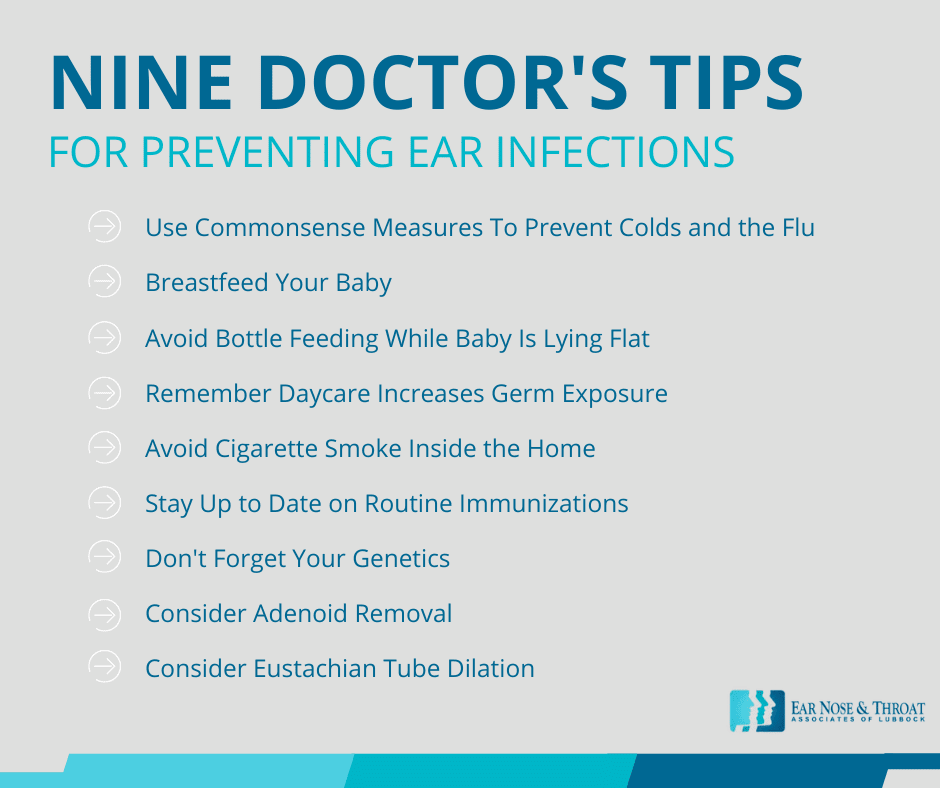9 Doctor’s Tips To Prevent Your Ear Infection Coming Back

You know the feeling: your ear is completely stopped up. You feel like you’re underwater, and you quickly realize your lipreading skills are sorely lacking.
You’ve tried every trick in the book: swallowing, holding your nose and bearing down, clearing your throat… and nothing works. That’s not even mentioning the pain and pressure in your ear!
As bad as an ear infection is for you, it’s even worse when it’s your child. An inconsolable toddler, pulling at her ear, crying and feverish, is truly heart wrenching.
But when it’s all over, after you’ve been to the doctor, started the antibiotics, and your child is sleeping soundly again, one question remains:
How can you prevent another ear infection from happening in the first place?
What Is an Ear Infection?
First, let’s take a look at what ear infections actually are so we can better understand how to prevent them.
Ear Infection Symptoms
The medical name for the ear infections we’re talking about is otitis media, or a middle ear infection. Otitis media is an infection of the middle part of the ear, where air and fluid tend to build up. Symptoms include a sudden onset of ear pain, difficulty hearing, drainage from the ear, and fever.
In young children, symptoms include irritability, pulling at the ear, and a decrease in the quality of their sleep (and consequently in yours!).
Ear Infection Susceptibility
Bacteria and viruses cause middle ear infections. This happens frequently when a cold virus moves from the nose through the eustachian tube and into the middle ear.
Since young children have shorter and straighter eustachian tubes, they are more prone to middle ear infections than adults. As children grow, their eustachian tubes lengthen and develop a slope, so a backup of fluid and infection into the ear is less likely.
Young children between the ages of three months and three years are most susceptible to ear infections. Many children have multiple ear infections every year. In our office, we see the highest incidence of ear infections in the winter, during cold and flu season.
Any type of cold, flu, bacterial sinusitis, or respiratory infection makes a person more susceptible to developing an ear infection. The buildup of pressure caused by air travel can also lead to an ear infection, especially if you travel with a cold virus.

Nine Tips for Preventing Ear Infections
Here are a few tips from our ENT physicians for preventing ear infections for the whole family.
Please note that these are only suggestions. It’s always best to consult with a doctor who knows your specific case.
Tip #1: Use Commonsense Measures To Prevent Colds and the Flu
Most ear infections begin with a cold or the flu, so one of the best ways to prevent an ear infection is to avoid getting a virus in the first place!
Commonsense measures — like staying away from people when they’re sick — can go a long way toward helping you and your child stay healthy. Remember to wash your hands frequently with soap and water for at least 20 seconds. Wearing a mask can help prevent the transmission of respiratory illnesses as well.
Tip #2: Breastfeed Your Baby
The American Academy of Pediatrics recommends breastfeeding exclusively for at least the first six months of a baby’s life, in part due to the immune protection breastfeeding provides to babies.
One study showed that exclusive breastfeeding for four months reduced the risk of ear infection by 50%, compared to those who didn’t breastfeed at all.
So while breastfeeding doesn’t mean children will avoid ear infections altogether, it could provide them with an immune advantage.
Tip #3: Avoid Bottle Feeding While Baby Is Lying Flat
Babies and toddlers who drink milk while lying down are more susceptible to ear infections. The milk can flow easily from the back of their throat into their middle ear through their short eustachian tubes. Sometimes we can even see milk when we look in the ears of infants in our office!
If you give a bottle to your baby, help them to recline but not lie entirely flat while they drink.
Tip #4: Remember That Daycare Increases Germ Exposure
Let’s face it: young kids aren’t known for their hygiene habits. So an environment full of children from other households will naturally increase the spread of cold germs.
It’s not often realistic or even desirable to remove a child from daycare. So keep in mind that repeat ear infections are more due to an underlying eustachian tube problem than to an excess of germs. Withdrawing a child from daycare won’t solve the eustachian tube issue, even if it reduces germ exposure.
(There’s even some evidence that more exposure to germs helps build up a child’s immune system.)
Tip #5: Avoid Cigarette Smoke Inside the Home
Secondhand smoke increases the likelihood of respiratory infections and ear infections in children. Making your home a smoke-free zone could really help prevent ear infections. If you’re having a hard time cutting the habit, try to avoid smoking inside the house and around your children.
Tip #6: Stay Up to Date on Routine Immunizations
Having your child vaccinated for viruses like Haemophilus influenza type b, pertussis, measles, and the flu can help prevent them from contracting these infections, which can in turn help prevent ear infections from developing.
Tip #7: Don’t Forget Your Genetics
We can’t choose our parents or our genes, but we know that genetic tendencies play a role in susceptibility to cold viruses and ear infections. If recurrent ear infections run in your family, you might consult an ENT doctor about the best methods of preventing ear infections in you and your children.
Tip #8: Consider Adenoid Removal
If your child is over the age of two and still fights frequent ear infections, you may want to talk to your ENT doctor about removing the adenoids. For some children, this can improve their eustachian tube blockage issues.
Tip #9: Consider Eustachian Tube Dilation
Adults over the age of 22 can consider eustachian tube balloon dilation to help prevent their eustachian tubes from becoming blocked and causing an ear infection.
When Should I Consider Seeing a Doctor for Recurrent Ear Infections?
Especially when it comes to children, the sooner you can get help for an ear infection, the better. This is especially true if it seems like the infection keeps coming back.
To watch for ear infections in young children, keep an eye out for irritability, crying when lying flat, waking in the night, and restlessness (especially in a child that usually sleeps soundly). Ear drainage may also indicate that your child needs medical attention.
ENT Associates of Lubbock treats ear infections for family members of any age. Give us a call to set up a consultation today.
Dr. Scolaro is a board-certified Otolaryngologist servicing the South Plains area. He has been practicing in Lubbock since 1990 and has earned a reputation as a skilled and experienced surgeon. He currently serves as the Medical Director for Covenant High Plains Surgery Center campuses, is a member of Covenant Health Partners and is an adjunct faculty professor for Texas Tech University Health Sciences Center School of Medicine. Learn more about Dr. Scolaro.
Categories:








